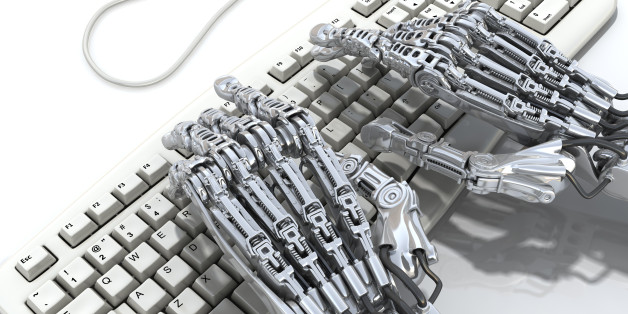Michael Rundle
 Almost one-half of all jobs could last automated yesteryear computers inside ii decades as well as "no regime is prepared" for the seismic sea wave of social modify that volition follow, according to the Economist.
Almost one-half of all jobs could last automated yesteryear computers inside ii decades as well as "no regime is prepared" for the seismic sea wave of social modify that volition follow, according to the Economist. The magazine's 2014 analysis of the impact of technology paints a pretty bleak motion-picture demo of the future.
It says that piece conception (aka "the elixir of progress") has e'er resulted inwards chore losses, commonly economies accept eventually been able to prepare novel roles for those workers to compensate, such every bit inwards the industrial revolution of the 19th century, or the nutrient production revolution of the 20th century.
But the footstep of modify this fourth dimension around appears to last unprecedented, its leader column claims. And the termination is a huge amount of doubtfulness for both developed as well as under-developed economies close where the side yesteryear side 'lost generation' is going to discovery work.
It quotes a 2013 Oxford Martin School study that estimates 47% of all jobs could last automated inwards the side yesteryear side xx years:
"Our findings hence imply that every bit applied scientific discipline races ahead, low-skill workers volition reallocate to tasks that are non-susceptible to computerisation – i.e., tasks requiring creative as well as social intelligence. For workers to win the race, however, they volition accept to teach creative as well as social skills," that study says.
The Economist also points out that electrical flow unemployment levels are startlingly high, but that "this moving ridge of technological disruption to the chore marketplace has entirely simply started".
Specifically the Economist points to novel tech similar driverless cars, improved household gadgets, faster as well as to a greater extent than efficient online communications as well as 'big data' analysis to areas that humans are speedily existence superceded. And piece novel start-ups are raising billions, they employ few people - Instagram, sold to Facebook inwards 2012 for $1 billion, employed simply thirty people at the time.
Those conclusions are echoed elsewhere. Another study ('Are You Ready For #GenMobile?'), to last released inwards total on 21 Jan yesteryear Aruba Networks, points out simply how fast traditional working models are changing.
It says that 72% of British people instantly believe they function to a greater extent than efficiently at home, as well as that 63% demand a WiFi network to consummate their tasks - dandy for a applied scientific discipline that was barely standardised 10 years ago.
Meanwhile inwards 'The Second Machine Age', out this week, Erik Brynjolfsson as well as Andrew McAfee combat workers are nether unprecedented pressure level yesteryear the automation of skilled as well as unskilled jobs.
In a recent Salon interview Brynjolfsson said: "technology has e'er been destroying jobs, as well as it’s e'er been creating jobs, as well as it’s been roughly a launder for the final 200 years. But starting inwards the 1990s the work to population ration actually started plummeting as well as it’s instantly fallen off a cliff as well as non getting dorsum up. We holler upwards that it should last the focus of policymakers correct instantly to figure out how to address that."
The BBC also produced a study before this month which claimed, inwards stark tones, that "the robots are coming to pocket our jobs".
"AI's are embedded inwards the cloth of our everyday lives," caput of AI at Singularity University, Neil Jacobstein, told the Beeb.
"They are used inwards medicine, inwards law, inwards blueprint as well as throughout automotive industry."
That study every bit good pointed out the modify volition send upon jobs of all kinds - from a Chinese mill Hon Hai which has announced plans to supplant 500,000 workers amongst robots inwards 3 years, to lawyers, surgeons as well as populace sector workers.
Opinions rest divided on the impact as well as hereafter of technological conception on the jobs market, as well as wealth inequality. The Economist leader argues that governments accept a responsibleness to nowadays inwards education, taxation as well as embracing progress, though the solutions are yesteryear no way obvious or without uncertainty.
If entirely nosotros could automate the procedure of making as well as implementing those political decisions - instantly that would actually last something.
Buat lebih berguna, kongsi:
